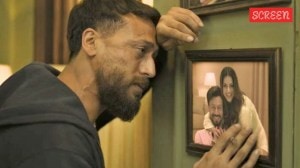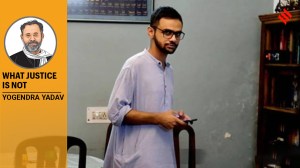‘Tech is divorcing us from the best part of our minds’: Paul Lynch, 2023 Booker winner
The Irish writer on his prize-winning Prophet Song, why he didn’t want to write a political book, and the dangers of modern-day technology
 In this interview, Lynch, 46, speaks of why he favoured the personal to the political in his novel, and the images he seeks to tell universal stories. (Source: paullynchwriter.com)
In this interview, Lynch, 46, speaks of why he favoured the personal to the political in his novel, and the images he seeks to tell universal stories. (Source: paullynchwriter.com)Prophet Song, about Eilish, a mother of four whose activist husband has been abducted by their shadowy government, begins with an epigram by German playwright Bertolt Brecht: “In the dark times / will there also be singing? / Yes, there will also be singing. / About the dark times.” At the Jaipur Literature Festival 2024, meeting its 2023 Booker-winning writer Paul Lynch, however, brings to mind another Brecht poem, To Posterity, due to the author’s indifference to political critiques of his book: “I ate my food between massacres. / The shadow of murder lay upon my sleep. / And when I loved, I loved with indifference.” In this interview, Lynch, 46, speaks of why he favoured the personal to the political in his novel, and the images he seeks to tell universal stories. Edited excerpts:
Much has been made of the book’s lack of paragraph breaks. Is that how you wrote them on a daily basis? Or did they start out more traditionally?
No, I wrote them like that. When you write your fiction, you have to find the form of the book that helps determine the story. And the novel did not want to be written in paragraphs, it’s very simple. Eilish is completely imprisoned within her reality. She is caught up in this flow of events that seem to have an unstoppable energy. So there should be no white space, there should be no room to turn. The reader should feel the same claustrophobia as her.
The writing dictum is that when you write something very specific, you access the universal. Critics have talked about the lack of specific names of contemporary politics in Prophet Song. Was that a conscious decision?
I think it’s idiotic to find a problem with the book because it doesn’t identify the nature of the political threat. That’s profoundly missing the point. If I identified the political nature, then the book will be about it. What it’s actually doing is [capturing] a particular sense of alienation. The book is about the foreground, not the background. The Iliad foregrounds the political and heroics. If you turn it inside out, you’re left with people in the background, how Troy affects them. Nobody’s done that. Nobody’s interested in foregrounding the ordinary, personal cost to events.
Your sentences are often long and winding. Today, fiction writers are told to aim for accessibility before embroidery. How do you situate yourself in that contrast?
Embroidery is the work of a lesser writer. You can write long, winding sentences that are still completely granitic in meaning. I believe in the principle of sufficient reason when writing, that every word should be in the right place for the right reason. If you can take that word out, then that sentence no longer means the same thing, or in the same way.
I suspect that a long sentence is definitely back in serious fiction, and that may be an unconscious revolt by serious writers against the tyranny of social media, against the atomization of our consciousness. Fiction is fighting to create a space that’s uniquely literary and serious, that says, “This is a space for consciousness. This is a space for thought that’s not going to be mediated by distraction.”
 Prophet Song, about Eilish, a mother of four whose activist husband has been abducted by their shadowy government, begins with an epigram by German playwright Bertolt Brecht (Source: Amazon.in)
Prophet Song, about Eilish, a mother of four whose activist husband has been abducted by their shadowy government, begins with an epigram by German playwright Bertolt Brecht (Source: Amazon.in)
You’ve set books in the 19th and 20th centuries, as well as more contemporary settings. How does research factor into the writing process?
I’m less interested in research as I write now. Primarily because what I’m chasing are images that are symbolic. Research is needed to truly understand the world I’m creating, but I forget about it when I’m writing.
A lot of writers use research to convey information, and I’m looking for knowledge and wisdom. When I wrote my first three novels, which were historical, I was trying to find an imaginative space where I could chase and ask questions about human nature. That was easy to do within historical settings because the present moment is so chaotic to find your way through.
But when I started writing Beyond the Sea, I realised that I was finding a way to approximate the mythic within the contemporary. To ask the same kind of questions. I, then, knew how to do the same thing in Prophet Song.
You’ve spoken about publishing being in danger because people aren’t reading as much, or only reading novels that are easily filmable. Are there any other dangers?
The fundamental threat of our epoch is that consciousness has been atomised by technology. We have unleashed something without truly understanding what it’s doing to us. The consequences are becoming evident in politics around the world. We have solved with technology an answer to a problem that cannot be answered within society.
There’s a particular dissatisfaction all of us have with life. We’ve looked to various ideologies to solve this problem for us, like capitalism, communism, consumerism and fascism. They’ve all failed. Now we’re looking at information technology to be the salve to our internal wound. But it’s never going to do that. Because the problem lies outside society. It’s a problem with the self and spirit.
And I’m not a religious person. But these are questions that we have to take very seriously. Technology is divorcing us from our own selves and our ability to communicate with the best part of our minds. People are getting increasingly lost, and when they’re lost, what do they do? They look to strong leaders… Underneath all the problems of the modern world, a lot of them economic — like late capitalism — is that we don’t know who we are anymore.
What’s your take on writing workshops or university programmes?
I didn’t ever attend a writing class. My schooling was journalism. I worked in newspapers and edited a lot. I think it’s necessary for writers to club together in the early stages because writing is an intensively vulnerable act. You’re baring your soul to the world. The resilience you need to be a writer, for a lot of people, takes time to learn. The support you get in any setting where writers are coming together is very helpful. Because the world always says no at the start. It takes time for you to build the confidence to say no back, and say, well, actually, I’m right, and I’m going to keep going on with this.
Photos




- 01
- 02
- 03
- 04
- 05


























